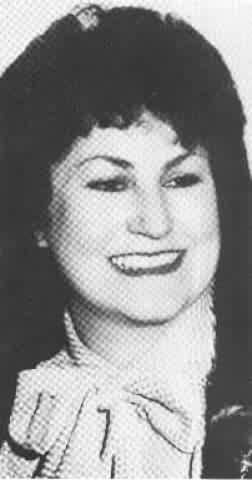|
|
|
 |
Jill was born in Loughton,Essex. At school she learned to play the piano and sang in the school choirs. When she was 15, her family moved to Canada. Her interest in music developed considerably after she left high school there. She began voice training lessons, then went to the University of Toronto where she gained her Bachelor of Music degree.
Jill came to London to work for a year at the London Opera Centre. She made her first appearance at Sadler's Wells, singing the part of Lady Deborah Crusoe (Crusoe's mother!) in Offenbach's "Robinson Crusoe"
She returned to Canada to work as a freelance. Her first job was with the Canadian Opera Company - as part of the make-up crew, but the following year found her in the chorus, and soon she was playing small roles. She then sang in recitals, concerts, operas - "a huge variety, but I came to the conclusion that there was not enough work all the year round in Canada. I like to be busy"
Toronto Gilbert and Sullivan Society invited her to sing The Fairy Queen in "Iolanthe" in April 1978. Two days after the opera closed, the D'Oyly Carte Company reached Toronto on the North American tour, and the Society entertained them at a party. "I met Royston Nash and Leonard Osborn. They said I could audition if ever I was in London~'
Jill auditioned in October, having allowed the Company just sufficient time to unpack from the tour. She joined the Company in January 1979. in time for the Australasian tour, "which I enjoyed tremendously"
Jill loves the contralto roles. "Critics have accused Gilbert of lacking sympathy for his aging ladies. But he certainly put a great deal into the parts for them. Drama. And fun. And a remarkably high proportion of the story-telling"
Off-stage, Jill does not look at all like an aging lady. A lot of make-up is needed for her to transform herself into Lady Sangazure or Dame Carruthers. "My time in the make-up crew at Canadian Opera stands me in good stead. I've also learned a lot since I joined D'Oyly Carte - talking to people about the roles, and watching how they make up. I believe that, for make-up to work properly, it's vital that I build on my own features. It's not convincing if I paint in a line that isn't there. What works is when I exaggerate and extend a line"
For Jill, the make-up is part of the performance. "It has a calming and settling effect. It helps me build up for the moment when I walk on stage."
As a chorister covering principal roles. Jill had to know each opera from two quite different points of view. "We're very well rehearsed and prepared," she says."When I am told that I am on, all I do is sit quietly in the dressing room and go through the part in my mind. I try to take it in my stride. I never go into a flat spin."
And, unlike Captain Corcoran, when Jill says never, that is precisely what she means.
| Artist Index | Main Index |